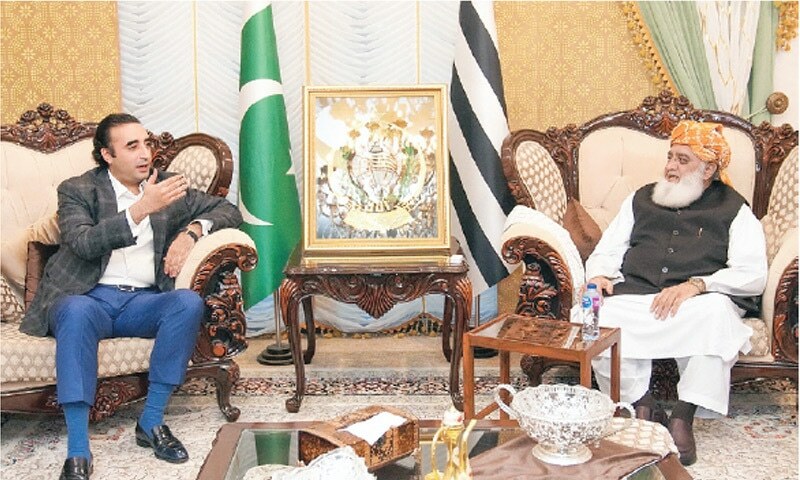
[ad_1]

• Party makes its proposals public, outlines provisions for creating federal and provincial constitutional courts
• Stalemate persists in the parliamentary committee as PTI terms PML-N’s suggestions ‘vague’
• Govt ‘gives Bilawal one-month’ to evolve consensus; Fazl confirms receiving govt draft
ISLAMABAD: There was a whiff of consensus on the proposed constitutional amendments during talks between the government and opposition on Friday, as major parties shared their drafts with each other; but only the PPP made its proposals public.
A meeting of the parliamentary committee with both government and opposition members, formed to review the proposed amendment, discussed the drafts threadbare, even though no decision was made.
The ruling PML-N and PPP have shared their proposals for the 26th constitutional amendment, which is required to be passed by the two houses of parliament — the Senate and the National Assembly — with at least a two-thirds majority.
The government’s draft was rejected by the PTI, which called it “vague and confusing”. The party, however, called the PPP’s proposals “clear and understandable”.
After the committee meeting, PTI leader Amir Dogar told reporters that the government wanted to present these amendments in the National Assembly on Saturday, but the plan was shelved after they opposed it.
The committee decided that the constitutional package would be introduced after the Shanghai Cooperation Organisation (SCO) summit, which will be held in the federal capital next week.
Separate drafts
Three drafts of the constitutional package have been discussed by the committee, led by PPP’s Khursheed Shah.
Talking to reporters after the meeting on Friday, Law Minister Azam Nazeer Tarar said recommendations were presented to the committee, but members could not reach any agreement.
“The PTI has asked for time to examine [the proposals],” the minister said, adding that JUI-F is also expected to share its draft with other parties tomorrow.
“We will meet tomorrow at noon to take matters forward.”
According to Mr Tarar, suggestions of lawyers’ bodies were also presented before the committee.
PTI Chairman Barrister Gohar Ali Khan, who also attended the meeting, said his party would give suggestions when a detailed draft is presented.
“[So far,] we have not seen anything from the government,” he claimed.
Mr Dogar, another PTI leader, said the government’s draft “has ambiguity” and requires clarity.
“The amendments require more time,” he said, adding that his party intends to hold discussions with its members, experts, and the JUI-F chief, Maulana Fazlur Rehman.
Later, PPP Chairman Bilawal Bhutto-Zardari met the Maulana.
Following the meeting, Mr Bhutto-Zardari told journalists that the government had given him a month to evolve consensus on constitutional amendments related to judicial reforms.
“How long will the government wait and give us space,” he asked, adding that he was trying his best to “continuously engage and put an agreed draft before the government through political consultation”.
While answering a question, Mr Bhutto-Zardari said the federal government was confident that it had the numbers to pass the constitutional amendments.
Mr Rehman, the JUI-F chief, said the government had shared its draft with them “for the first time” and his party will hold talks with PPP to come up with a joint proposal.
The draft will also be shared with the PML-N and PTI to reach a consensus, Mr Rehman said, adding other political parties would also be included in the consultations.
PPP’s proposals
The draft amendments submitted by the PPP propose the establishment of a Constitutional Court, along with changes to Article 175, which deals with the powers of courts, and Article 175A, which outlines the process of judges’ appointment.
As per the draft, Article 175AA will be added to the Constitution to set up a Federal Constitutional Court (FCC).
A new provision, under Article 175AB, would outline the FCC’s structure — a chief justice and four judges.
Each province will have an equal representation in the FCC, with the chief justice appointed on rotation for three years from each province.
Article 175AC would allow for the court to be set up in Islamabad, while the addition of 175AD would remove the existing Article 184 from the Constitution.
This essentially means that the Supreme Court’s powers to take suo-motu notice — as outlined under Article 184 — will be taken away and transferred to the FCC.
The contents of the said article would be reproduced as Article 175AD, and any reference to the Supreme Court will be replaced with that of the FCC.
Similarly, PPP has also proposed removing the existing Article 186 — which empowers the president to seek Supreme Court’s opinion on a question of public importance — and replace it with Article 175E to transfer the advisory jurisdiction to the FCC.
Under the proposed Article 175F, the FCC’s decision will be final and couldn’t be challenged at any forum.
The PPP has also proposed constitutional courts in each of the four provinces. These courts will have a chief justice and as many judges as determined by the provincial governments.
Like with the Supreme Court’s original jurisdiction, the party has proposed to take away high courts’ power to hear complaints filed by aggrieved citizens and transfer it to the provincial constitutional courts.
The proposed Article 191AD would replace Article 199, and any reference to high courts would be replaced with the provincial constitutional courts.
However, provincial constitutional courts won’t have the power to hear appeals against lower courts’ decisions, which will remain under the jurisdiction of respective high courts.
Under Article 191AF, the decision of provincial constitutional courts could be challenged in the FCC for a final order.
Published in Dawn, October 12th, 2024
[ad_2]
Source link






